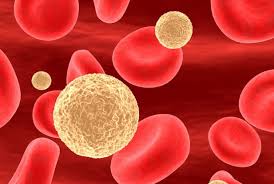Circulating tumor cells (CTCs) are cells that break off from a cancer tumor and move into the blood stream. Doctors sometimes test for CTCs to see if breast cancer cells are active in areas of the body besides the breast.
Several previous studies have linked the number of CTCs to the prognosis of metastatic breast cancer (cancer that has spread to one or more parts of the body away from the breast). Some of these earlier studies found that five or more CTCs in 7.5 ml of blood suggests a worse prognosis and fewer than five CTCs suggests a better prognosis.
Three studies looked at the link between CTCs and prognosis in women diagnosed with either early-stage or metastatic breast cancer. The results suggest that even one CTC in a blood sample is linked to a worse prognosis. These results were presented at the 2010 San Antonio Breast Cancer Symposium (SABCS).
German study
In this large study, CTC levels were measured four times during treatment in 3,754 women diagnosed with early-stage breast cancer that had a higher-than-average risk of recurrence (the cancer coming back). All the women received chemotherapy and hormonal therapy after surgery. Treatment given after surgery to lower the risk of recurrence is called adjuvant treatment.
CTC levels were measured right after surgery, after adjuvant chemotherapy was done, and after 2 and 5 years of adjuvant hormonal therapy. More than 78% of the women had one or more CTCs in their blood sample and 21.5% of the women had no CTCs in their blood sample. Three years after initial diagnosis:
88.1% of the women with CTCs were alive with no cancer recurrence (disease-free survival) compared to 93.7% of the women without CTCs
based on disease-free survival figures, women who had one or more CTCs were 88% more likely to have a recurrence over 3 years
the likelihood of recurrence was linked to the number of CTCs; the risk of recurrence was more than doubled when two or more CTCs were detected and more than quadrupled when five or more CTCs were detected
87.9% of the women with CTCs were alive and had no metastatic recurrence (called distant disease-free survival) compared to 94.2% of the women without CTCs
overall survival (survival with or without cancer recurrence) was 93.2% in women with CTCs compared to 97.3% in women without CTCs
based on overall survival figures, women who had one or more CTCs were twice as likely to die over the 3 years after diagnosis
One of the times the researchers tested for CTCs was at the end of chemotherapy treatment. Some doctors think testing for CTCs during and after chemotherapy might help judge treatment response as well as help figure out if more treatment is needed. The researchers think CTCs still detectable during and after chemotherapy are more likely to be cancer stem cells. Breast cancer stem cells are sometimes called the "mother" cells of a breast cancer -- they make other breast cancer stem cells and regular breast cancer cells. Research has shown that current treatments destroy regular cancer cells but aren't good at destroying breast cancer stem cells.
French study
In a much smaller study, CTC levels were measured before chemotherapy started in 267 women diagnosed with metastatic breast cancer. More than 60% of the women had one or more CTCs and 35% of the women had no CTCs. Nearly 45% of the women had five or more CTCs. Women who had five or more CTCs were twice as likely to have had the cancer grow and twice as likely to have died during the study.
U.S. study
In this very small study, 21 women diagnosed with metastatic breast cancer had aggressive chemotherapy followed by a bone marrow transplant. The researchers measured CTC levels before and after the bone marrow transplant. Six of the women had one or more CTCs before the transplant and nine women had one or more CTCs 1 month after the transplant. Women with five or more CTCs before the transplant were twice as likely to die after the transplant. Women who had five or more CTCs 1 month after the transplant were more likely to have recurrence and less likely to survive.
These and other studies suggest that CTC testing could help doctors figure out the risks of the cancer coming back or growing and the overall prognosis in women diagnosed with either early-stage or advanced-stage breast cancer. This could allow for more customized treatment plans based on CTC test results. For some women, CTC test results might suggest that a more aggressive treatment plan is needed. For other women, CTC test results might suggest that a less aggressive treatment plan is needed and could spare them possible treatment side effects.
More research is needed to help doctors understand the best way to use CTC test results to determine risk and prognosis and to figure out how the results can help recommend treatment that makes the most sense for an individual woman's situation. Still, if you've been diagnosed with breast cancer, you may want to ask your doctor if a CTC test might help plan your treatment or judge your response to treatment.
